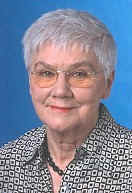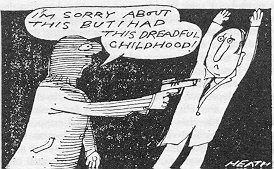|
|
Dorothy Rowe's latest book
This equivocation was not just in Dr Rowe's talk but it is also in her book. She thinks that the problem of Northern Ireland is to do with the Puritans and Catholics not getting on in the province itself, when it is the result of the claim that Eire makes on the North and the quest to conquer it. The explanation that it all springs from the nature of Puritanism seems to Dorothy Rowe all the more solid as she herself springs from a Presbyterian family that told her that Catholics were bad people. But she did not stop to think that this sort of thing did not lead to terrorism in Australia, so why should it in Northern Ireland? She cites friends who grew up together becoming enemies in Ulster (p20) but thinks this is owing to chance rather than to the clash of institutions. On this ground she opposes religious-based schools, on principle. Yet in the English Civil War of the 1640s and the Civil War of USA in the 1860s there are examples of families who divided between the two sides. An institutional clash can divide us in duty, no matter how fondly we loved each other beforehand; and even though we might go on loving each other throughout the war. Dorothy Rowe has a friend, Anthony, who showed her around Ulster and convinced her that the Puritans were to blame for the whole of the troubles. What she had heard from her parents made her all the more open to that idea (p313ff).
In her talk and in the book she put over the idea that hatred was thinking of the hated as less than human and as unclean and worthless objects (217), but in fact to hate is to personify rather than to reify. We can only truly hate people. We cannot truly hate mere objects. Whatever we think of the enemy population we are duty bound to kill. But then hatred is not as dysfunctional as Dorothy Rowe thinks it is. The clash of institutions that she tends to overlook is way more of a menace than mere hatred. In war soldiers maybe do not think of the enemy as persons but then they do not particularly hate them either. Soldiers tend to be rather indifferent to their enemy and accept him as practical part of their duty. Dr Rowe feels that some people need enemies to solve two problems; the dullness of their lives and the angers and fears that they may have (p321). They have learnt early in life to meet their needs by creating enemies (p322). But this all seems a bit lame as an explanation of enemies and within a page she links this to a war in the Balkans that is clearly institutional in character. The book has some insights. She cites Richard Gregory to the effect that we build up an hypothetical world rather than the facts being manifest (p47), but it is mainly a Politically Correct Guardian reader's outlook on the world, and it fails to get to the root cause of anything. To protect her PC outlook she attacks the idea that genetics can tell us much, despite the clear fact that humans are human genetically. She says that the twin studies in genetics have three major flaws (p185). The first is that the motivation behind them was political. She simply fails to see that motivation is just not germane to the facts or to the truth. Indeed, she is not clear whether there is any common truth and believes, absurdly, that we all have our own personal truth. Secondly, she says that not enough account has been taken of how similar the environment is when identical twins have been separated at birth (p186), despite saying elsewhere, that none of us see even the same event in exactly the same way. Finally she says that identical twins do not necessarily have the same genetic traits! She attempts to make this good by saying that in competition in the womb for space and blood supply one twin can do better than the other (p186). So she cannot even tell what is genetic and what is not. On reading through the book I am not sure that I can recommend it. Dr Rowe is one of the better of the pop psychologists but, typical of the whole genre, she finally has very little to say.
|
|
 DOROTHY Rowe thought her book Friends and Enemies was germane to the problem of war and to the terrorism at the Twin Towers. She felt that these actions were a result of hatred and on a par with private personal enemies – and so the opposite of love. But we need to examine the institutions which provide the context for war and terrorism. In her talk she had an equivocation between an enemy who is hated and one who is simply on the other side of a declared war. Clearly, we might like someone whom we were duty bound to oppose in war, so enemy means both one we hate and also one we are duty-bound to oppose. Many people have the idea that the problem of war is down to human nature. However, it is clear that modern war is a matter of the institutional clash of states. The fact that states often have to resort to conscription shows that human nature is not enough to account for modern war.
DOROTHY Rowe thought her book Friends and Enemies was germane to the problem of war and to the terrorism at the Twin Towers. She felt that these actions were a result of hatred and on a par with private personal enemies – and so the opposite of love. But we need to examine the institutions which provide the context for war and terrorism. In her talk she had an equivocation between an enemy who is hated and one who is simply on the other side of a declared war. Clearly, we might like someone whom we were duty bound to oppose in war, so enemy means both one we hate and also one we are duty-bound to oppose. Many people have the idea that the problem of war is down to human nature. However, it is clear that modern war is a matter of the institutional clash of states. The fact that states often have to resort to conscription shows that human nature is not enough to account for modern war.